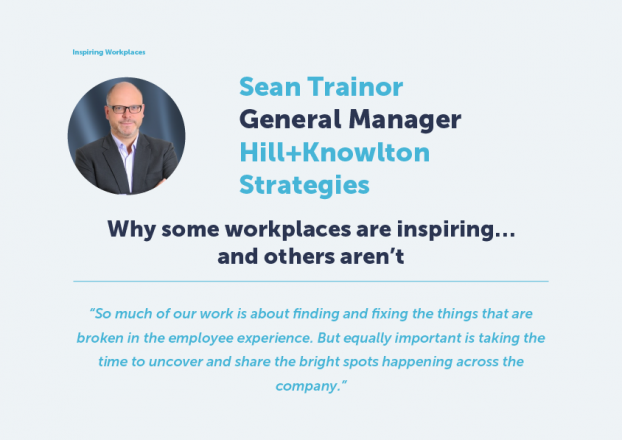
03rd February 2021
How to be intentional about inspiring yourself and others
by Joe Bloggs, Company Name

We talk a lot about the importance of Inspiration on productivity, motivation and overall happiness but how do you actively build inspiration in to your life and others? This article by Brad Shuck, Ph.D., Associate Professor and Program Director of the Human Resource and Organizational Development program, University of Louisville explores the latest research on inspiration and how to make inspiration intentional.
From the Article:
Most often it happens at the new year. We assess what direction we’re headed, what we need to do to get there and how can we stay inspired along the way. Pablo Picasso may have said it most simply, “Inspiration exists, but it has to find you working.”
Brad Shuck, Ph.D., University of Louisville, has developed further thinking around the topic of intentional inspiration. He started by segmenting the impact of inspiration into three clear categories: organization, leadership and individual.
To get a deeper understanding of how we can realize intentional inspiration at these levels, we sat down with Dr. Shuck to talk more about the ideas behind intentional inspiration.
[…]
Tell us more about the inspirational leader. How are these leaders driving inspiration across teams and the organization?
Dr. Shuck: Think about those leaders who really inspired you – took you to the next level in your thinking and your work. These are the kind of leaders who we want to work hard with and learn beside. If we want to be inspirational leaders, we have to do some intentional work.
First, awareness becomes the currency of inspirational leadership. Inspirational leaders are aware of their landscape and they choose moments of inspiration carefully. They know that moments matter and they capitalize on those opportunities. Moments come in meetings or one-on-one’s where we have the chance to inspire possibility. They come in projects that push our boundaries and drive hope and possibility.
One quality of inspirational leaders that can cut across all types of organization is presence. Inspirational leaders are present in moments and share in both the ups and downs with their team. When leaders are physically present, they share in social spaces with their team and drive emotional and social inspiration. But when leaders step away and are emotionally and socially absent, or they build barriers between themselves and their team, they crush even the faintest hint of inspiration. Barriers can come in the form of physical barriers such as office walls and separate facilities to emotional and social barriers like someone feeling left out, isolated or ignored. When someone feels ignored, the capacity for inspiration is just not there. Leaders who share in those moments, who bring people along with them and who are emotionally connected to their teams, inspire long-lasting results as well as higher levels of engagement and innovation.
Inspirational leaders also use framing to their advantage. Our words matter and how we see the world often shapes what we think could be possible. Instead of framing something as a problem, they shape it as an opportunity to get better – to learn or reinvent. In our research, leaders who embodied this quality used words like hope, future and possibility instead of words like cannot, impossible or the past. Framing our words is a psychological heuristic that most of us use to make decisions about the way something is presented. We base our decisions, and our inspiration, on how a context is framed.
Lastly, inspirational leaders encourage teams to set aspirational goals and listen to their employees. Nothing takes the wind out of the sail than someone putting hurdles around what is possible for us personally. Research from my colleagues at BI WORLDWIDE shows that inspiration was 23% higher with employees who believed their leader really listened to them. In fact, additional research from Thrash and Elliot offered that employees who had leaders that listened and supported inspirational goals were more creative, had higher levels of self-esteem, worked toward mastery and set bigger goals. And the list goes on and on.
You can read the article in full online: Building inspiration into your work and life.
Make sure to explore Inspiring Workplaces for other content and insights about Leadership.





